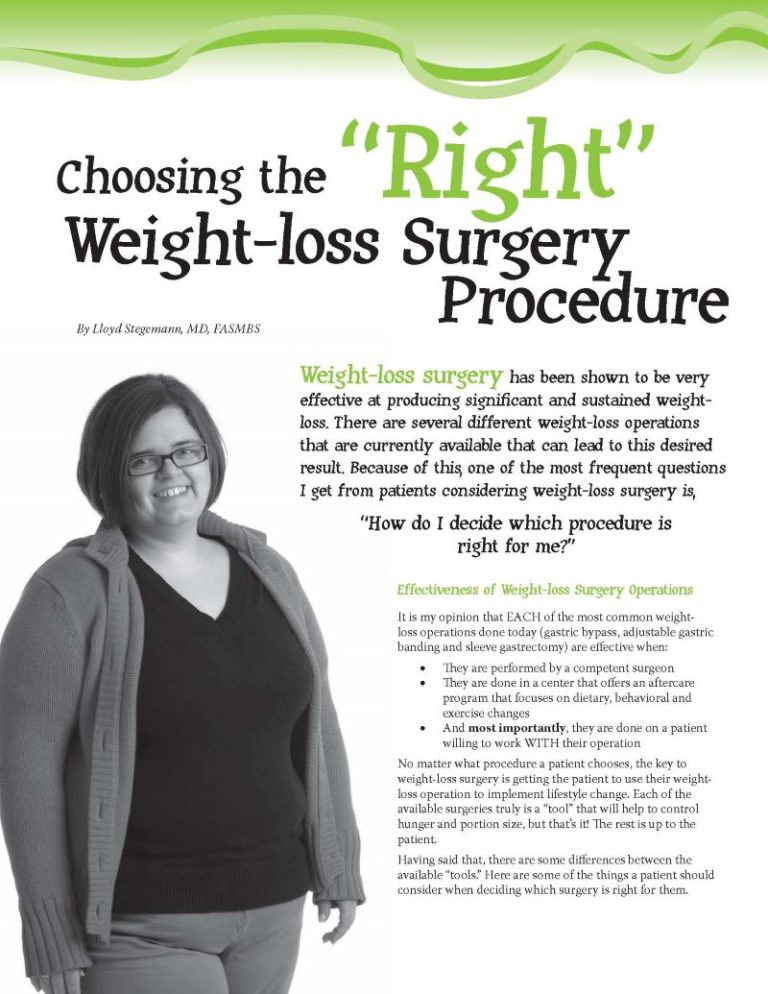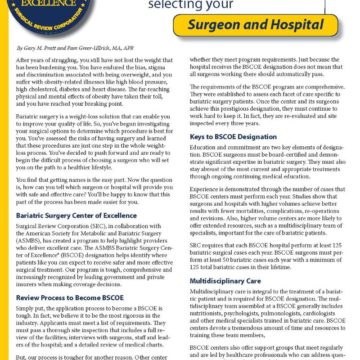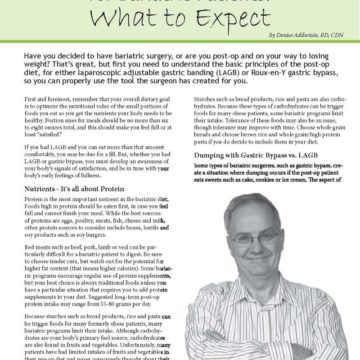Choosing the "Right" Weight-loss Surgery Procedure


by Lloyd Stegemann, MD, FASMBS
Summer 2009
To view a PDF version of this article, click here.
Weight-loss surgery has been shown to be very effective at producing significant and sustained weight-loss. There are several different weight-loss operations that are currently available that can lead to this desired result. Because of this, one of the most frequent questions I get from patients considering weight-loss surgery is, “How do I decide which procedure is right for me?”
Effectiveness of Weight-loss Surgery Operations
It is my opinion that EACH of the most common weight-loss operations done today (gastric bypass, adjustable gastric banding and sleeve gastrectomy) are effective when:
- They are performed by a competent surgeon
- They are done in a center that offers an aftercare program that focuses on dietary, behavioral and exercise changes
- And most importantly, they are done on a patient willing to work WITH their operation
No matter what procedure a patient chooses, the key to weight-loss surgery is getting the patient to use their weight-loss operation to implement lifestyle change. Each of the available surgeries truly is a “tool” that will help to control hunger and portion size, but that’s it! The rest is up to the patient. Having said that, there are some differences between the available “tools.” Here are some of the things a patient should consider when deciding which surgery is right for them.
Considerations When Choosing a Surgery Type
Expected Weight-loss
In general, gastric bypass patients will lose around 70 percent of their excess weight, sleeve gastrectomy patients will lose around 60 percent, and gastric banding patients will lose around 50 percent.
All of this depends, however, on how well a patient follows up and if the patient works on all the necessary lifestyle changes that must occur to make them successful over the long-term. I think it is important to keep in mind that even though gastric banding patients tend to lose less weight, they still see significant improvement in their health and quality of life.
Reliability of Weight-loss
Gastric bypass and sleeve gastrectomy patients almost always achieve the expected weight-loss outlined above. I do not worry about these patients losing weight; I worry about them regaining it down the road. This will occur if they do not make the necessary lifestyle changes in the first year after their weight-loss operation.
Weight-loss with adjustable gastric banding is much more variable. Some patients will lose 70-90 percent of their excess weight (remember, 50 percent is expected), but some will lose almost no weight. You see, with a band, if patients are not following-up and working on lifestyle change IMMEDIATELY, they just will not lose weight. The good news is that when a gastric banding patient loses weight, they almost always keep it off because they had to make lifestyle changes to take off the weight and that is what keeps it off for ANY weight-loss operation.
Fast or Slow
Gastric bypass and sleeve patients will typically lose five to seven pounds a week early on and will reach their expected weight-loss 12-15 months after their operation. Some patients say, “I am having this operation to lose weight and I want it off NOW!” That is more of a gastric bypass/sleeve type of weight-loss.
On the other hand, gastric banding patients tend to see a slower, steadier weight-loss (losing one to two pounds per week) but will see this continue until they reach their expected weight-loss around two years after their operation.
Fear of the Unknown
There are good studies looking at the long-term effects of gastric bypass and adjustable gastric banding. It appears that both of these operations are safe, lead to significant weight-loss and improvement in weight related medical problems, and most importantly, maintenance of the weight-loss.
The same cannot be said for the sleeve gastrectomy at this point. Certainly the studies currently available show this operation to be safe and effective, but because the operation is so new, we do not yet know what is going to happen to patients 5 or 10 years after this operation. Will they see weight regain? Will there be problems due to removing so much stomach? We just do not know the answer to these questions yet.
Ability to Follow-up
In order to get an adjustable gastric band to be effective, it HAS to be adjusted. In the first year after surgery, gastric banding patients are typically seen more frequently than gastric bypass or sleeve patients, so it is important that a gastric banding patient be able to make these follow-up appointments in order to achieve maximum weight-loss.
If your employer makes it very difficult for you to get to your doctor appointments or if you live a great distance from your surgeon (more than 2 hours), you are less likely to follow-up and therefore less likely to do well with your band.
Fear of Needles
In order to “fill” the band, a needle must be used. The needle is small and fills do not really cause much pain, but if you are afraid of needles it does not matter if the needle is small. I will never forget a patient that I inherited after he went to Mexico to have his band placed. I went to fill his band for the first-time and he said, “You have to use a needle? Dr. Stegemann, I am deathly afraid of needles!” As I put the needle into his port, he passed out. Needless to say, he really should have thought about that before he had a band.
Punishment Factor
Gastric bypass patients will very likely experience “dumping” if they eat foods containing sugars. After eating a sugary food, their heart starts racing, they start sweating and then they get severe abdominal pain, dizziness and oftentimes diarrhea. This really helps them stay away from those foods that may have caused them problems in the past.
Some patients like the idea of knowing that if they “cheat” on their operation the operation will punish them for it. There is no dumping with gastric banding and sleeve patients so they need to be more disciplined in their food choices when it comes to sweets.
Foreign Body Fear
Gastric band patients need to be VERY comfortable with having the band in you for the rest of your life. We do not take the band out when patients reach a healthy weight. Please do not be like one of my band patients who called two weeks after surgery and said, “Dr. Stegemann, you have to take this out. I can’t sleep knowing it is inside of me.”
Reversibility
Some patients choose to have a band because they believe that if the “cure” for obesity is found or they develop some other “problem,” they can have it taken out. While it is true that taking out a band is pretty straightforward, there are few reasons why a surgeon would remove a band.
And, despite what you may have heard, a gastric bypass is also reversible. Certainly it is more challenging to reverse a bypass than it is to remove a band, but it can be done. A sleeve gastrectomy, however, cannot be reversed. If a band is removed or a bypass is reversed, a patient almost always begins regaining weight as they no longer have the “tool” that controlled their hunger and portion size.
Fear Factor
Many patients fear a gastric bypass or a sleeve gastrectomy because they feel it is “more invasive” and therefore more dangerous. While it is true that a gastric bypass and a sleeve gastrectomy are bigger operations, when we look at the complication rates of all three operations, they are the same: 10-15 percent of patients will experience a complication related to their operation at some point. I think it is also important to keep in mind that weight-loss surgery has NEVER been safer than it is today.
What NOT to Consider When Choosing a Surgery
When deciding which surgery is right for you, I would suggest that you NOT consider the following:
Loose Skin
Loose skin is a reflection of significant weight-loss and it does not seem to matter if the weight-loss is slow or fast. If a gastric band patient, a sleeve patient and a gastric bypass patient all lose 150 lbs, they will ALL have some degree of loose skin.
Cost
In most markets, gastric bypass and sleeve gastrectomy are more expensive than adjustable gastric banding. While this is not important if insurance is paying for your surgery, it is important to those that have to pay for their surgery themselves. I always encourage my “cash pay” patients to choose their operation first and THEN figure out how they are going to pay for it.
Conclusion
There is no study that your surgeon can do that will tell him or her what is the “best” operation for you. If you are a good candidate for surgery, then very likely you could do well with ANY weight-loss operation. Ultimately it comes down to you knowing you, and I am convinced that patients are the best decision makers on which operation is right for them. Go with your gut, no pun intended. The operation YOU feel is right for you is very likely the right one for you!
About the Author:
Lloyd Stegemann, MD, FASMBS, is a private practice bariatric surgeon with New Dimensions Weight Loss Surgery in San Antonio, TX. He is the driving force behind the Texas Weight Loss Surgery Summit and the formation of the Texas Association of Bariatric Surgeons. Dr. Stegemann is a member of the American Society for Metabolic and Bariatric Surgery and the OAC Advisory Board.
by OAC Staff Members Kendall Griffey and Michelle “Shelly” Vicari Winter 2024 In a world that often…
Read Articleby Rachel Engelhart, RD; Kelly Donahue, PhD; and Renu Mansukhani, MD Summer 2023 Welcome to the first…
Read ArticlePost-operative addiction is often overly simplified as transfer addiction or cross-addiction, assuming individuals “trade” compulsive eating for…
View Video










